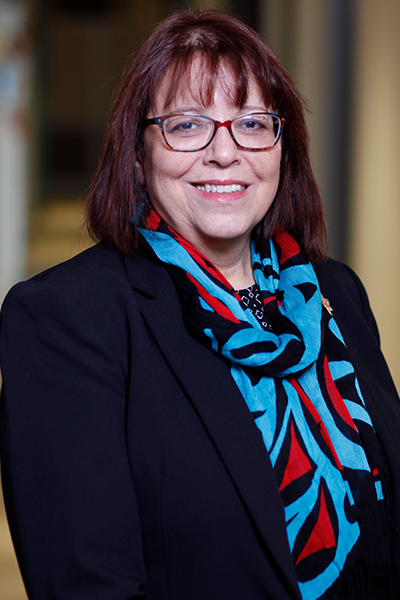2022 FALL E-NEWSLETTER
Circle of Hope
 Our Hearts May Be Heavy But We are Still Here
Our Hearts May Be Heavy But We are Still Here
Greetings Friends and Relatives,
This past August, the College Fund hosted fifteen Student Ambassadors for leadership training in-person for the first time in three years. We were filled with excitement in anticipation of surrounding ourselves with incredible stories, celebrations of achievements, and even to laugh with and give a hug to a few of the thousands of scholars we treasure and see as the future of our communities and world.
It was all that, but it was also something more and distinctly different from prior years. This year we also shared in the great heaviness each of the fifteen students is now carrying, and the responsibility and weight of their journeys to create stronger, healthier tribal communities – communities where their relatives will be safe, and their ways of life, their culture, their languages, and their knowledge can and will be lived for generations to come. The sense of urgency and the weight of that urgency following the pandemic is palpable and real in a much deeper way.
According to the CDC, from 2019 to 2021 the life expectancy for Native Americans fell from 71.8 years to 65.2 years. That is the lowest life expectancy (by more than 10 years) and largest drop of all races and ethnicities in this country. This data confirms what we already knew about the losses experienced by Native communities as a result of the pandemic.
I understand the heaviness of our scholars’ hearts and feel the same pain when I think about what we’ve lost during the past few years. The losses have been crippling and devastating, and at the same time incredibly motivating. Every single Student Ambassador was touched by COVID in a profound way, through the loss of family, knowledge, and culture.
These losses have inspired them to dig deep and set aside their grief so they can focus on filling the gaps that were glaringly spotlighted during the pandemic – gaps in healthcare, insufficient commerce/supply chains, food, technology, the ability to harvest and share natural resources, and housing to name a few.

I understand the heaviness of our scholars’ hearts and feel the same pain when I think about what we’ve lost during the past few years.

These gaps are fueling determination, focus, and empowerment. More students than ever before are starting or returning to school, staying in school, and graduating, which is reflected in the significant increase in scholarship applications for this semester (29%) and the increase in last spring’s graduation rate. They understand the needs and are using their education to not only gain knowledge, but to build confidence and power.
This fall we celebrate both Indigenous Peoples’ Day and Native American Heritage Month. At the College Fund we throw our whole selves into celebrating our existence, our culture, and our history during these times of recognition for Native Americans and all Indigenous peoples. This year I need to celebrate – our survival, our determination, our resilience, our power, our very existence – and I, and all College Fund scholars, need you to join us. We need your support, your strength, your voice, and your prayers as we celebrate the fact that WE ARE STILL HERE!
Celebrate with us this fall through one of the many opportunities you will find here – and I thank you for always fighting with and for us, for lifting us when our hope wanes, and for motivating us with your love and care.
Cheryl
Why Indigenous Peoples’ Day?
We asked our newest Student Ambassadors for their thoughts on the growing movement of shifting from Columbus Day to celebrating Indigenous Peoples’ Day. See what they had to say.
Create Your Own Personal Land Acknowledgement
This Native American Heritage Month, we ask you to create your own personal land acknowledgement and share it on your social media platforms, with family and friends, and during Thanksgiving dinner. Land acknowledgements are more than just explanations, name-checking the tribes and Tribal Nations whose lands we now occupy. These statements help demonstrate respect for and awareness of the enduring relationship between Indigenous people and place. They also serve to educate others on Indigenous stories, issues, and histories that are often overlooked.
Learn more about the importance of land acknowledgements and the land you live on at www.thisisindiancountry.com
 I was born in Phoenix, Arizona, and I wish to acknowledge the Native inhabitants of the land on which that city lies. It is the ancestral land of the Akimel O’odham (Upper Pima) and Piipaash (Maricopa) people, who continue to live there today. In earlier times, the region was home to other Native cultures, including the Hohokam, the Salado, and the Puebloans.
I was born in Phoenix, Arizona, and I wish to acknowledge the Native inhabitants of the land on which that city lies. It is the ancestral land of the Akimel O’odham (Upper Pima) and Piipaash (Maricopa) people, who continue to live there today. In earlier times, the region was home to other Native cultures, including the Hohokam, the Salado, and the Puebloans.
These Indigenous people thrived in an unforgiving desert landscape through foresight and ingenuity. They built complex irrigation systems to support sustainable farming, and they strove to live in balance with the land’s resources. I hope fervently that the people of present-day Phoenix, faced with the increasing pressures of population growth, climate change, and water scarcity, can find the wisdom and humility to learn from the example of the land’s original inhabitants.
Again, I acknowledge these Native people, past and present. I am grateful for their stewardship of the land where I was born. I am proud to honor them, in whatever small way, through my work with the American Indian College Fund.
Land Acknowledgement –
Ted Downum, College Fund Grant Writer/Researcher
(born Phoenix, Arizona, August 1970)
